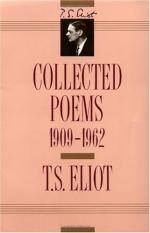|
This section contains 2,820 words (approx. 10 pages at 300 words per page) |

|
Almost every poem Eliot wrote is dominated by one or more traditional epistemological concerns—knowledge and belief, memory and perception, forgetting, recognition, and precognition. But his poetry is also dominated by prophets and prophecies, magi, choric forebodings, people who know but cannot see or speak, or if they speak are not heeded. His people are surrounded by a world of talking birds, cryptic messages, telling images, and words unheard; and what his people come to know is what they should have known or do know already. Knowing is, for Eliot, an act of recognition or re-cognition…. The silent message, the word unheard—an image, a gesture, an atmosphere—is often associated with issues of life and death. Those who hear the word live; and those who do not, die. (pp. 179-80)
The word unheard … takes various forms. It may be knowledge in the possession of one who...
|
This section contains 2,820 words (approx. 10 pages at 300 words per page) |

|


